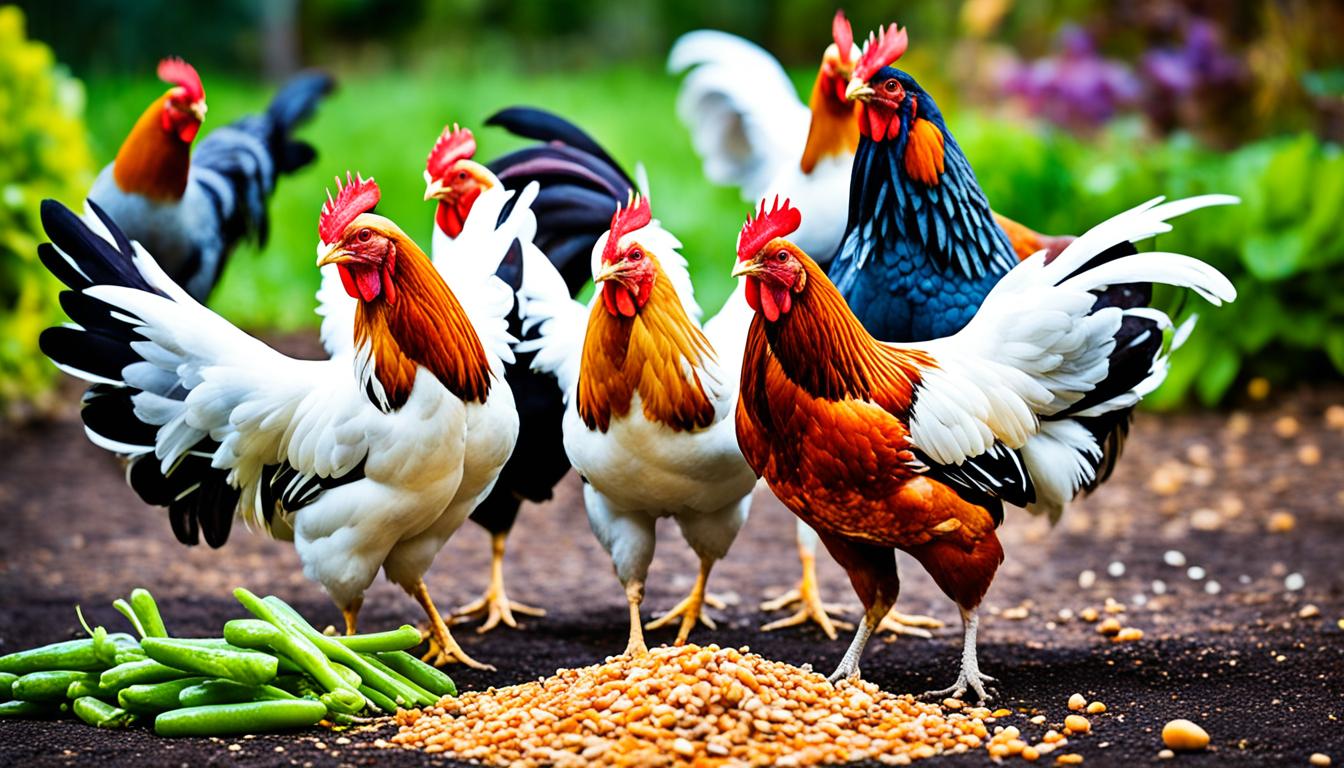Chickens need the right food to stay healthy and make eggs. Their main food is chicken feed. But what do chickens eat , they also eat other things like greens and kitchen scraps. This helps them have a balanced diet.
Key Takeaways:
- Chickens typically have a diet that consists mostly of commercial chicken feed, followed by greens and healthy kitchen scraps.
- Domesticated chickens’ predecessors had to find sources of nutrition other than grains for much of the year as grains were only available a small part of the year in the wild.
- Backyard chickens raised 1,000 years ago likely weren’t laying an egg a day due to their foraging and free-ranging diet not supporting such high egg production rates.
- Chickens today have been bred for high production rates, leading to significantly higher nutritional requirements compared to their ancestors.
- Chickens can eat various foods aside from commercial feed, such as lawn clippings/grass, snakes, frogs, lizards, eggs, bugs, kitchen scraps, hay, animals, crops, fruit from trees, fly larvae/worms, etc.
- Feeding chickens grains, seeds, legumes, and beans is beneficial as these foods are shelf-stable and can be bought in bulk for long-term storage.
- Avoid feeding chickens unhealthy foods, and ensure they maintain a balanced diet for their health and well-being.
The Importance of Chicken Feed
Chicken feed is vital for the health and well-being of these birds. It gives them nutrients, vitamins, and minerals essential for living well. Today’s backyard chickens need more nutrients than their wild cousins because they lay more eggs.
There are many types of feed for different chicken needs. For example, there’s layer feed for chickens that lay eggs and broiler feed for those raised for meat. This feed helps egg layers produce eggs well and meat chickens grow fast and strong.
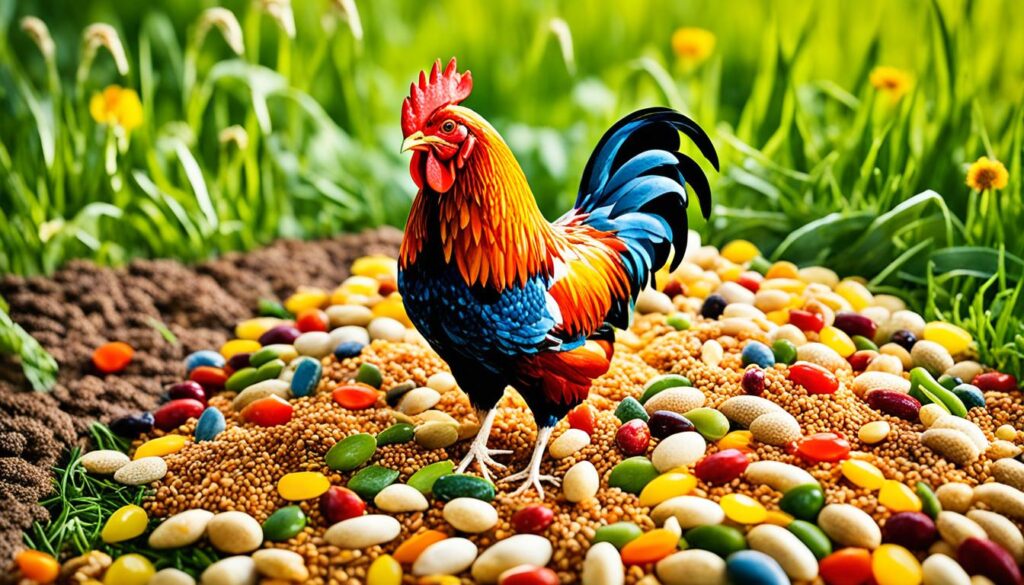
Choosing the right feed depends on your chicken’s age, type, and what they do. Baby chicks need starter feed from the time they hatch until they are 8 weeks old. This helps them grow healthy.
Pullets, young hens, should eat grower feed from 8 to 16 weeks. Hens older than 16 weeks need layer feed to lay eggs well.
When picking feed, look for the amount of protein. It should be between 16-20%. Protein is key for growing muscles, feathers, and staying healthy. For instance, chick starter crumble has 20% protein and benefits like omega-3s, prebiotics, and probiotics. Alternatively, pullet developer crumble has 16% protein and important vitamins and minerals.
Although commercial feed is the main food, chickens can eat many other things. They like to find bugs and eat plants too. They eat kitchen scraps, fruits, and fly larvae. But remember, a balanced diet is important. Chicken feed keeps the nutrition steady, especially when their usual foods are scarce.
Therefore, using chicken feed ensures your flock stays healthy and lays plenty of eggs. It’s key to their diet because of the balanced nutrition it offers. While they can eat other things, relying on feed meets their full diet needs.
Alternatives to Chicken Feed
Chicken feed is vital for these birds, but they can also eat other things. A varied diet gives them different nutrients and makes their day fun.
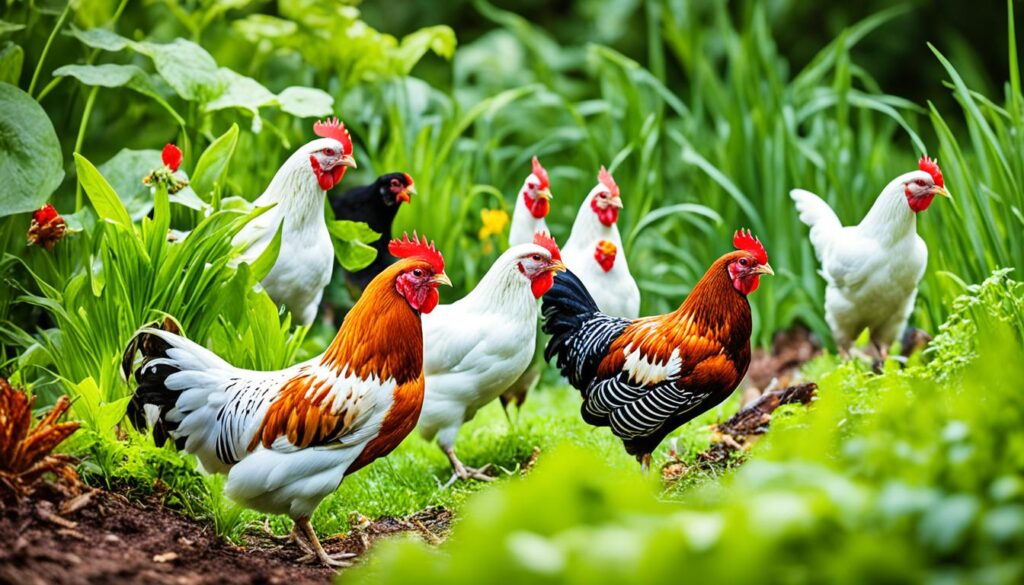
One choice is giving them chicken treats. These can be special snacks made for chickens or mealworms. Be sure to keep treats limited to keep their diet balanced and prevent them from gaining too much weight.
Kitchen scraps are also helpful for chickens. Things like vegetable trimmings and leftover fruits are great. A menu like this helps reduce waste and gives chickens lots of tastes and textures to enjoy.
Chickens love looking for snacks themselves, especially bugs and plants. In a safe area, they can hunt for insects and peck at safe plants. This adds extra nutrition and lets them do what comes naturally.
You can help their foraging by putting out plants for them to eat. Weeds, herbs, fruits, and veggies are all good. This plant-based food adds variety and important nutrients.
Remember, mixing things up with their food is good. But make sure what you offer is safe and doesn’t harm them. Sticking to a well-balanced approach keeps your chickens healthy and happy.
Creating a Balanced Diet for Chickens
Chickens need specific nutrients and much research has gone into understanding this. Millions of dollars have been spent to know what chickens should eat. It’s crucial to include feed, treats, greens, protein, and grains in their diet.
Most of a chicken’s diet should be chicken feed. It’s made to meet their needs depending on their life stage. For the first six weeks, they eat starter feed. From 6-18 weeks they have grower feed. Once they’re 18 weeks old, they switch to layer feed. Starter feed is high in protein and energy. Layer feed includes more protein and calcium for egg-laying.
Green vegetables add vital vitamins and minerals to a chicken’s diet. Lettuce, kale, or chard can be given in addition to their feed. These greens not only add nutrients but also keep the diet fun for chickens.
For protein, give them things like mealworms or insects. These supplies ensure chickens digest protein well. Even if chickens roam freely, they still need a specific diet. They might need a bit more protein than usual because just foraging isn’t enough.
Give grains like corn or oats as an occasional treat. But grains should be only 10% of their diet. Avoid giving too much grain to prevent problems. Moderation with treats is key, although some grain mixes and scratch feed are okay.
The right chicken feed for the life stage is the main element of their diet. Add greens, protein sources, and grains for a complete meal. With this approach, you make sure your chickens get all they need to be healthy and lay eggs.
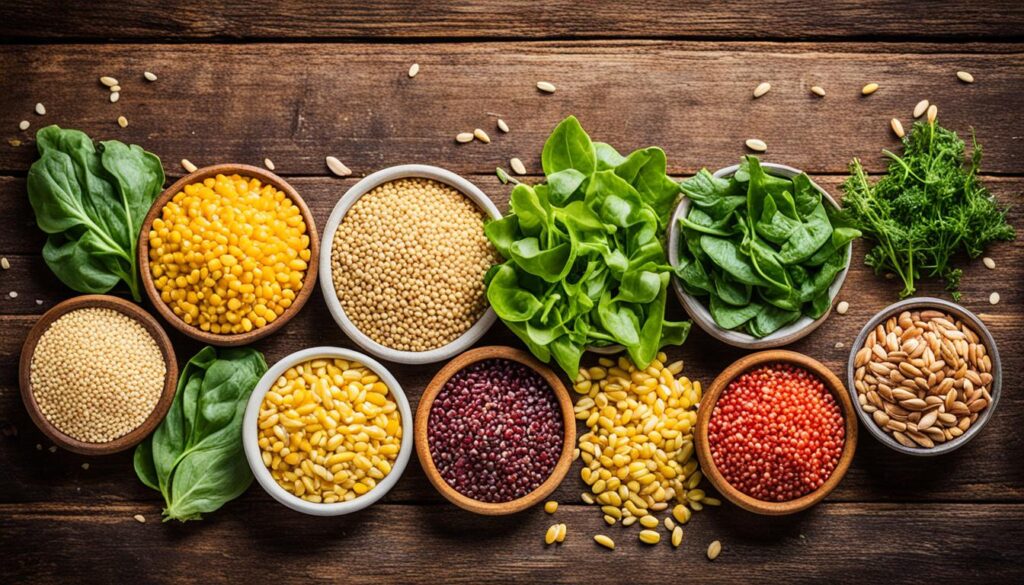
Key Takeaways:
- Chicken feed should make up the majority of a chicken’s diet, as it is specially formulated to meet their nutritional needs.
- Greens such as lettuce, kale, or chard can be offered to provide essential vitamins and minerals to chickens.
- Protein sources like mealworms or insects can be given to supplement the chickens’ diet.
- Grains should only make up around 10% of a chicken’s total diet and can be offered as an occasional treat.
Integration and Feeding Considerations
Mixing or changing food for your chickens needs good planning and watching. To ensure a good change and top nutrition, follow these tips:
- Separate the groups: Start by keeping new and old chickens apart. Give each lot their own food area to avoid fights. This step helps all chickens get the food they need without trouble.
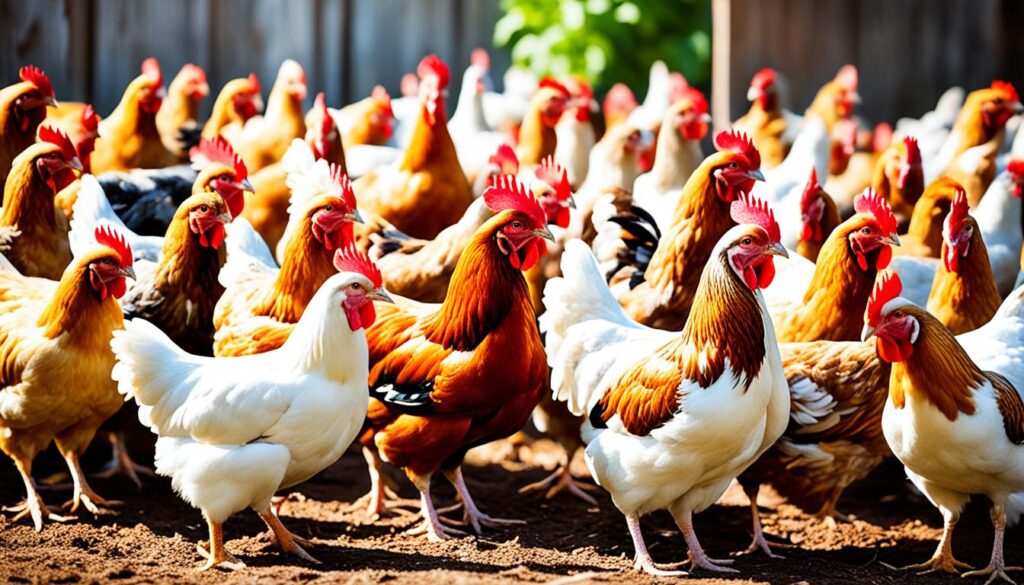
- Monitor behavior: Watch how the chickens act when they meet. If some are mean or stressed, separate them. Then, mix them back slowly.
- Transition slowly: When switching feeds, take your time. Mix old and new food for a few days. This gentle switch helps their stomachs and makes sure they get all they need.
- Observe feeding schedule: Keep to feeding times set for your chickens. This makes their stomachs work well and stops them from eating too much or too little. Think about their age, kind, and job when picking the feed times.
- Monitor behavior and health: Always keep an eye on how your chickens look and act. Watch for signs they’re not eating enough, like getting thinner or making fewer eggs. If you notice any problems, fix them fast to keep your flock healthy.
Handling flocks and changing food needs careful work. But, your chickens will be healthier and do better because of it.
Conclusion
It’s essential to give chickens a mix of foods for their health and happiness. Chicken feed is key, but adding treats, greens, and varied proteins helps a lot. This way, you ensure your chickens are not just eating but thriving.
For protein, there are many options in commercial feeds. Things like soybean, corn, and different meals help chickens grow. These foods give the chickens what they need for their bodies to develop well.
Apart from protein, chickens need carbs, fats, and various vitamins. Each group gives them energy or helps their bodies work. The right amounts of these nutrients make sure your chickens are healthy.
A good diet for chickens includes various feeds and snacks. It’s vital to change the feed as the chickens grow, like using starter feed for chicks and layer feed for egg-laying hens. It’s also smart to avoid foods that can harm them.
Giving chickens a mix of food and sticking to a schedule keeps them healthy. A happy chicken gives more eggs. Be sure to provide what they need, and your flock will thank you with good health and work.
